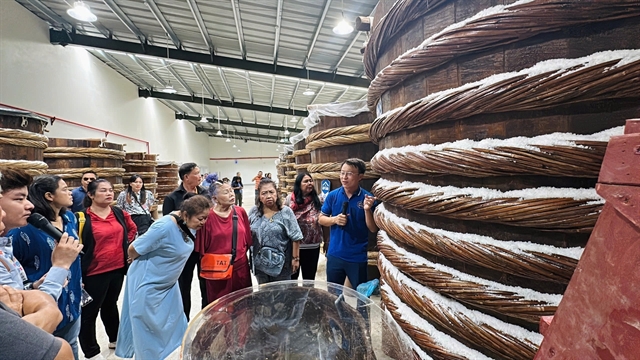 Economy
Economy

 |
| Tourists visit plant of Lê Gia Company to learn about fish source production in Thanh Hóa Province. OCOP is expected to enhance national brand and competitiveness of Vietnamese goods. — VNA/VNS Photo |
HÀ NỘI — Việt Nam is seeking a new strategic direction for its One-Commune, One-Product (OCOP) programme, with a focus on digitalisation to overcome funding shortages, limited marketing and fragmented sales networks, officials said.
“OCOP products have secured a place in the domestic market and are gradually reaching international markets,” said Nguyễn Anh Tuấn, deputy director of the Ministry of Industry and Trade’s Domestic Market Development Department, at a conference on Monday to discuss solutions to promote OCOP.
Launched in 2021, the programme aims to boost rural development by promoting regional specialties ranging from food and beverages to handicrafts and community tourism. It has certified more than 17,000 products at 3-5 star level, with over 120 receiving the top five-star rating.
Despite owning 132 OCOP showrooms, the programme faces several challenges, including a fragmented distribution system, weak digital and marketing capacity, and limited customer engagement strategies, requiring new strategic development to further promote OCOP.
Deputy President of the Vietnam Association of Handicraft Villages Hà Thị Vinh said OCOP has driven the development of handicraft villages in Việt Nam, pushing them to standardise production, adopt traceability systems, maintain strict control over production and shift from scattered to professional models.
“OCOP should not only be about products that meet standards but must also be tied to local cultural stories to win over customers,” Vinh said. “It is not simply about selling a ceramic item or a specialty food but about allowing customers to experience the essence of traditional crafts, the memories of village life, local cuisine and the price of Vietnamese culture.”
Vinh added that many OCOP products have achieved the national five-star rating and are close to international standards, but their presence in global markets remains limited.
The lack of modern technology and equipment, small-scale production and an inadequate trade promotion strategy are major reasons for limited exports of OCOP products, she said.
She urged the Government to support leading producers who can guide industries to meet international standards and expand global reach, and called for showrooms in domestic and international shopping centres as well as participation in international trade fairs to access wider markets.
Vinh also stressed the importance of storytelling.
“Strong communications will not only make OCOP stand out at home but also gain recognition and trust abroad. The fundamental solution is to build a sustainable supply and demand linkage,” she said, adding that OCOP should function as an ecosystem connecting various sectors rather than promoting individual products in isolation.
According to Tuấn, the ministry has proposed that in the next five-year period the programme will combine cultural and tourism experiences with a focus on improving infrastructure and human resources for OCOP promotion.
The programme aims to increase the share of OCOP products rated four or five stars, boost the application of digital economy tools in management, operation and e-commerce, and upgrade packaging, labelling, traceability and quality control while ensuring sustainability and environmental protection.
“OCOP will be not only a rural economic development programme but also a national brand to affirm cultural identity and enhance the competitiveness of Vietnamese goods,” Tuấn added. — VNS




